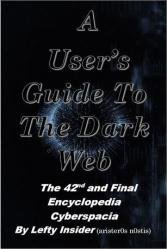Encyclopedia Cyberspacia : The 42nd and Final Encyclopedia Cyberspacia
- Добавил: literator
- Дата: 19-02-2023, 16:11
- Комментариев: 0
 Название: Encyclopedia Cyberspacia : The 42nd and Final Encyclopedia Cyberspacia
Название: Encyclopedia Cyberspacia : The 42nd and Final Encyclopedia CyberspaciaАвтор: Lefty Insider
Издательство: Leanpub
Год: November 2022
Страниц: 433
Язык: английский
Формат: pdf (true)
Размер: 12.8 MB
This Guide is intended to provide you the information required to efficiently and safely navigate the Dark Web.
A how-to book on how to safely navigate and survive the Dark Web. Appendices include information regarding online history, philosophy, anonymity, and privacy in general. Following the chapters, you will find appendices, which provide supplemental information, history, and opinion about Cyberspace.
This is fourth book is intended to be a reference book and an addition to the Library of Imperial Trantor on the Dark Web. The Dark Web in reality consists of websites that exist in darkness, on overlay networks that use the Internet but require specific software, configurations, or authorization to access. This guide exposes what you need to do and what you need to know to successfully transition through the Dark Web of semi-private computer networks. This part of Cyberspacia is where individuals can communicate and conduct business anonymously without divulging identifying information, such as personal identification or a user's location. The Dark Web consists of small, friend-to-friend peer-to-peer networks, as well as large, popular networks such as Tor, Freenet, I2P, and Riffle operated by semi-public organizations and individuals. This book seeks to answer the following questions, while educating the reader with helpful information.
The World Wide Web also called the Surface Web or Clear Web (mostly encrypted, thus sometimes clear), is a part of the Internet. It is not as some think that the Web is THE Internet nor is Facebook, Google, Apple, Amazon, and Microsoft. They are just parts of the whole. It is now more than a billion websites that a typical search engine used now by more than three billion worldwide users. You access it with a web browser such as Microsoft Internet Explorer, Microsoft Edge, Google Chrome, Safari, Pale Moon, Brave, or better yet Mozilla Firefox.
The Deep Web (we are talking about Deep not Dark here) is also a part of the Internet and consists of anything that a standard search engine cannot access outside the enormous one billion; some estimates are as high as four billion, or so websites existing on servers around the globe. Spiders or also called bots crawl the surface web to populate the search engine databases but cannot effectively reach into the Deep Web.
Deep Web content can be found almost anytime you navigate away from a typical search engine and do a search directly in a website – government databases and libraries contain huge amounts of Deep Web data. Searching the archives of a newspaper is an example of the Deep Web. It can also mean that router settings have deliberately or accidentally have made accessing these hosts virtually impossible. Some estimates put this part of the Internet at 400 to 500 times larger than the Surface Web.
What the Deep Web consists of are some of the things you cannot find on the Surface Web.
- Password protected pages.
- Attendance records, Medical certificates etc.
- Bank records.
- Encrypted Chat Messages (WhatsApp, Facebook Messenger etc.)
- E-mails sent between users.
- Purchase-requiring content when not indexed on Search Engines (songs/videos, school courses, etc.).
So in a nutshell, the content, which exists on the Internet, but cannot be accessed via Search Engines, or requires special permission, is Deep Web content. Some websites also intentionally “de-index” themselves, so that they can only be accessed by people who know the exact URLs, these websites are also a part of the Deep Web, and host thing such as harmless discussions on conspiracy theories, and other such stuff.
So not all un-indexed content is “illegal” or harmful, the Deep Web is not illegal, it is purely “non-indexed” content, nothing more. There is a parallel Internet you may not have run across yet only accessed by a special Dark Web browser and home to a freewheeling collection of sites for everything from anonymous activism to illicit activities. Not to mention regular people who do not wish to be surveilled, or keep their identities secret. The Dark Web (sometime called the DarkNet) is a small portion of the Deep Web that has been intentionally hidden and is inaccessible through standard web browsers. Dark Webs or hidden site, include Freenet and Tor, or The Onion Router.
Although the Dark Web has some nebulous uses, most uses are innocuous. For example, people who want to communicate and associate online without fear of being shut down by a government agency. The Dark Web is much smaller than the Deep Web, and it is made up of numerous types of sites like Bitcoin markets, The Hidden Wiki, and porn sites. It is perhaps most notorious for its anonymous marketplaces that often sell illegal products like drugs, fake documents, and weapons. A Dark Web is any overlay network that can be accessed only with specific software, configurations, or authorization, often using non-standard communications protocols and ports. Two typical Dark Web types are friend-to-friend networks (usually used for file sharing with a peer-to-peer connection) and privacy networks such as Tor.
Скачать Encyclopedia Cyberspacia : The 42nd and Final Encyclopedia Cyberspacia
[related-news] [/related-news]
Внимание
Уважаемый посетитель, Вы зашли на сайт как незарегистрированный пользователь.
Мы рекомендуем Вам зарегистрироваться либо войти на сайт под своим именем.
Уважаемый посетитель, Вы зашли на сайт как незарегистрированный пользователь.
Мы рекомендуем Вам зарегистрироваться либо войти на сайт под своим именем.
